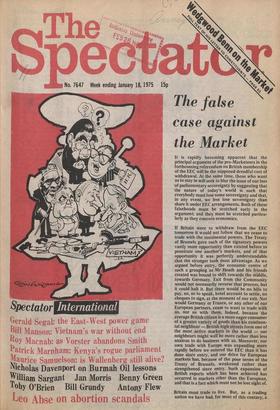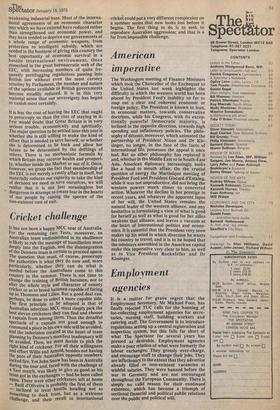The false case against the Market
It is rapidly becoming apparent that the principal argument of the pro-Marketeers in the forthcoming referendum on British membership of the EEC will be the supposed dreadful cost of withdrawal. At the same time, those who want us to stay in will seek to blur the issue of our loss 'of parliamentary sovereignty by suggesting that the nature of today's world is such that everybody must lose some sovereignty and that, in any event, we less lose sovereignty than share it under EEC arrangements. Both of these falsehoods must be scotched early in the argument; and they must be scotched particularly as they concern economics.
If Britain were to withdraw from the EEC tomorrow it would not follow that we cease to trade with the continental powers. The Treaty of Brussels gave each of the signatory powers vastly more opportunity than existed before to penetrate one another's markets, and of that opportunity it was perfectly understandable that the stronger took most advantage. As we argued before entry, the economic centre of such a grouping as Mr Heath and his friends created was bound to shift towards the middle, towards Germany. Exit from the Community would not necessarily reverse that process, but it could halt it. But there would be no bills to pay, no, so to speak, hotel account to settle, no cheques to sign, at the moment of our exit. Nor would Germany or France, or any other of our European partners, cease to want to trade with us, nor us with them, Indeed, because the average British citizen is a more eager consumer of a greater variety of goods than his continental neighbour — British high streets form one of the most active markets in the world — our neighbours might well be more rather than less anxious to do business with us. Moreover, our own trade with Europe was expanding more rapidly before we entered the EEC than it has done since entry, and our drive for European markets has, because of the poor terms of the Treaty of Brussels, weakened rather than strengthened since entry. Such expansion of British exports which has been achieved has occurred in markets other than the European, and that is a fact which must not be lost sight of.
Britain must trade to live. But, as a trading nation we have had, for most of this century, a weakening industrial base. Most of the international agreements of an economic character into which we have entered have reduced rather than strengthened our economic power, and they have tended to deprive our governments of a whole range of economic weapons, from protection to intelligent subsidy, which are needed in the business of giving this country the best opportunity of economic survival in a hostile international environment. Once enmeshed in the great bureaucratic web of the EEC, with increasing numbers of quite frequently pettifogging regulations passing into British law without even the most cursory scrutiny by Parliament, the number and nature of the options available to British governments become steadily reduced. It is in this very material sense that our sovereignty has begun to vanish most certainly.
It is less the cost of leaving the EEC that ought to preoccupy us than the cost of staying in it. Few would doubt that Great Britain is in very serious trouble, economically and spiritually. The major question to be settled later this year is whether she is still willing to make the kind of effort that is needed to save herself, or whether she is determined to lie back and allow her future to be determined by the driftings of others. There is no mechanistic formula by Which Britain may recover health and prosperity, whether inside the Market or out of it. Once, however, we grasp the fact that membership of the EEC is not merely a costly affair in itself, but materially reduces our capacity to take the kind of decision we need to save ourselves, we will realise that it is not just meaningless but dangerous to attempt to create fear in the hearts of our people by raising the spectre of the non-existent cost of exit.



































